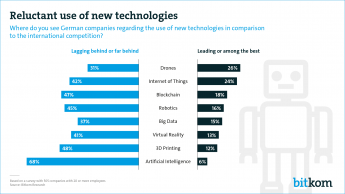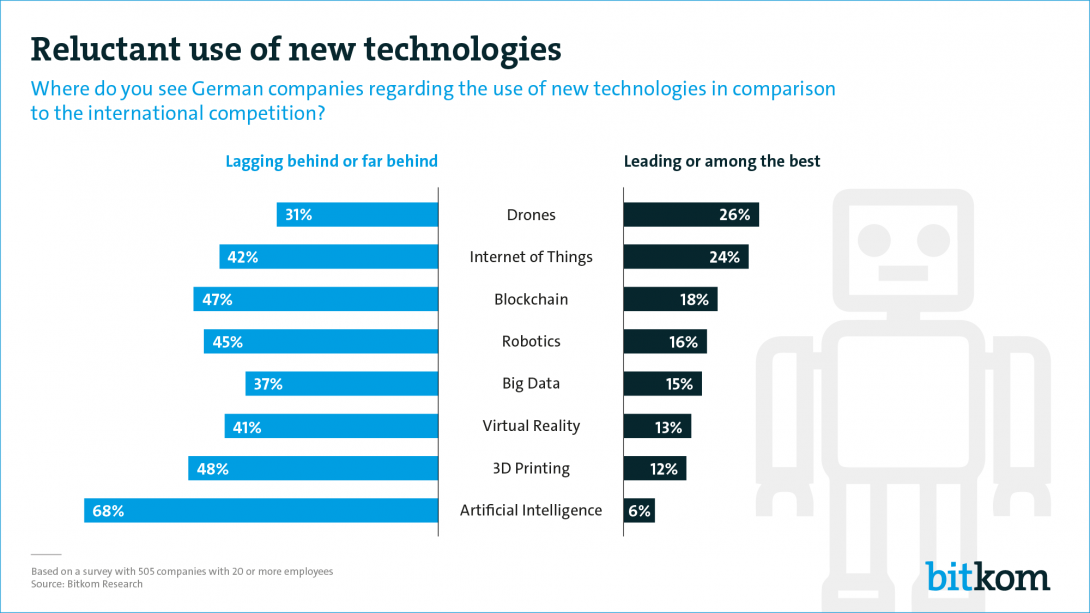German businesses reluctant to use new technologies
- Many companies believe they are falling behind on Artificial Intelligence, 3D printing, Blockchain and Robotics
- Main obstacles are data protection, security requirements and lack of skilled workers
Berlin, 05 February 2018 – German companies have to ramp up the implementation of new technologies to keep up with their international competition. This is the result of a representative survey among 505 businesses across all industrial sectors conducted on behalf of Germany’s Digital Association Bitkom. For instance, two thirds (68 per cent) of surveyed CEOs and managing directors believe that German businesses are lagging behind in their implementation of artificial intelligence. About every second person surveyed believes the same to be true for 3D printing (48 per cent), as well as for Blockchain (47 per cent), and robotics (45 per cent). On other topics, such as the Internet of Things (42 per cent), Virtual Reality (41 per cent), Big Data (37 per cent) and drones (31 per cent), German businesses are only slightly more optimistic.
“In the past, lagging behind in the implementation of new technologies mainly meant efficiency losses and comparatively higher production costs in the long term. But today new technologies such as Artificial Intelligence or Blockchain have the power to disrupt entire industries in record time”, says Bitkom President Achim Berg. “Of course businesses shouldn’t introduce new technologies as an end in itself, but they would be well advised to take new technological possibilities seriously and to assess the opportunities for their existing business model – or even explore new business models.”
Overall, German managers believe the German economy is on a good path in terms of digitalisation. 36 per cent believe the German economy is among the best performing compared to its competitors in this regard, while 2 per cent even see Germany in first place. Virtually manager thinks Germany is far behind, and only 13 per cent claim the German economy as a whole is lagging behind. 44 per cent think Germany is in the middle of the pack.
However, only a minority sees German companies in a leading position in their use of technologies. The use of drones comes in at first place (26 per cent), followed by the Internet of Things (24 per cent), Blockchain (18 per cent), robotics (16 per cent), Big Data (15 per cent), Virtual Reality (13 per cent), and 3D printing (12 per cent). Artificial Intelligence comes in last at 6 per cent. Berg: “Germany is leading in the research and development of new technologies, for example in Artificial Intelligence or Blockchain. But we succeed too rarely in employing these technologies in practice.”
Companies believe the greatest hurdle for the implementation of new technologies is data protection, named by almost every second manager surveyed (45 per cent). Data protection is followed by technical security requirements (39 per cent), and a lack of qualified employees (33 per cent). About every fourth company points to lengthy decision-making processes (27 per cent), and about every fifth (18 per cent) manager lacks the time to integrate new technologies into their everyday business. 14 per cent say they lack the financial means to employ new technologies, while 7 per cent name uncertainty about their economic benefit. “Considering how well many German companies currently perform and how busy they are, it is understandable that they say they don’t have the time to consider new technologies. But that doesn’t mean that such an approach is smart.” says Berg. “If you want to be in business tomorrow, you cannot afford to neglect the technologies of the future today.”
Regarding methodology: the results are based on a survey conducted by Bitkom Research on behalf of Bitkom. The survey included 505 companies with 20 or more employees. The survey is representative for the economy as a whole. The questions were: “If you think about the implementation of new technologies in companies, where do you see Germany in comparison to its international competitors?” And “What do you believe to be the greatest hurdles for the implementation of new technologies in your company?”









